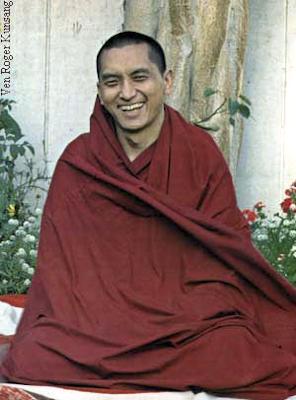Compassion is the Essence of Religion
Lama Zopa Rinpoche explains the essence of spiritual practice at the 33rd Kopan Course held at Kopan Monastery, Nepal, in 2000. This teaching is an edited excerpt from Lecture Four of the course.

Do not engage in any unwholesome action—any action that is harmful to oneself and other sentient beings.
Engage in the perfect wholesome action, perfect virtue.
This means action which is beneficial to oneself as well as to other living beings.
Subdue one’s own mind.
This is the teaching of the Buddha.
Taming the mind or subduing the mind is not only in Buddhism, it should be the essence of all the religions. If this practice is not there, then no matter how much we chant prayers or rituals, if we do not subdue the mind, that brings problems to our life. If we do not subdue the mind it gives problems to ourselves and others—to the world, to other sentient beings.
This applies to any religion. It should be the essence of any religion, otherwise, how can the religion benefit—how it can bring peace and happiness to the individual person’s life as well as to the world? If the essence of religion is not reducing anger, if it’s not subduing the mind, subduing anger, desire and the dissatisfied mind—all these things that make life unhappy—it cannot work. The simple way of expressing this is to say that all these emotional thoughts make our own life and other’s lives unhappy.
By practicing patience, anger is subdued. If we practice compassion, the thought cherishing others, we subdue the ego, the self-centered mind. Only caring for ourselves and cherishing ourselves, only working for ourselves, not benefiting others—is countered by practicing compassion, the good heart. By cherishing others, we subdue the ego, the self-centered mind. By renouncing the dissatisfied mind of desire, we achieve contentment and inner peace. We achieve peace in our heart by practicing renunciation and letting go of desire, the painful mind of grasping. Letting go of this, we achieve contentment, inner peace and satisfaction in our life and in our heart. The essence of religion should be these things. At least, at least, it should be subduing the mind.
The lack of this explains why there are a lot of wars between religions. For hundreds and hundreds of years, for an unbelievable length of time, so many people have been killed and have suffered for that.
Therefore, it is very important to practice compassion, which is the essence of religion. It’s not only in Buddhism—any religion should be like that. We should all practice compassion and kindness towards others. Often His Holiness the Dalai Lama says, ‘My religion is kindness towards others.’ That makes sense: my religion is kindness towards others. That has great meaning. If that is practiced, it is impossible to have all these wars between religions for years and years, where so many hundred thousand, millions of people get killed or suffer. I guess, maybe, they missed out on what the real meaning of religion is. They missed out or didn’t get to practice the real essence of religion—compassion or kindness towards other living beings.
If our mind is devoid of compassion, if our heart is devoid of compassion, inner peace and contentment, then no matter what extensive things or external practices we perform, it is not real religion. It’s not spiritual. Our heart is empty of spiritual practice.
Of course, there is no question that according to the teaching of the Buddha, “practicing the Dharma” means to subdue our mind, to tame the disturbing, obscuring, emotional thoughts that bring so much suffering to ourselves and others from life to life. The disturbing thoughts have been giving suffering to ourselves and others from beginningless time—not only from the time of birth in this life but from beginningless rebirth up to now.
If we continue like that, if we don’t change our mind, we will continue giving harm to ourself and others without end, so, therefore, it is very important. Everybody wants peace and happiness. Everybody wants peace. Everybody wants happiness. Numberless other living beings—insects or human beings, devas, or any other living beings—everyone wants happiness just exactly as we do. Nobody wants suffering and everybody wants peace and happiness. Therefore, it is extremely important that the real essence of any spiritual practice, any real Dharma, is to tame one’s mind. To make the mind soft, not rough, not harmful, not vicious or violent. Not like that. A soft mind, a loving mind, being kind towards others.
